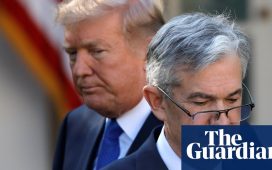Unlock the Editor’s Digest for free
Roula Khalaf, Editor of the FT, selects her favourite stories in this weekly newsletter.
The Bank of England’s Monetary Policy Committee will make their rate decision tomorrow, and announce it on Thursday. In between, the Federal Reserve will sneak in and steal Britain’s thunder with their own rate announcement (the meeting ahead of which begins, to be fair, today). It will be the third time this year that has occurred. And it is scheduled to happen twice more before year-end.
Which decision is more important in shaping UK financial conditions? Probably the Bank’s. But not definitely.
In an IMF Selected Issues Paper, Agnese Carella, Ruo Chen, Katherine Dai, Gloria Li, Ruy Lama, and Roland Meeks took a look at this regular diary clash. Because, as they put it:
…the FOMC’s monetary policy decisions could affect UK domestic demand through their impact on the UK financial markets.
The blue line in the chart below is taken from the report. This shows the yield on the two-year gilt over the couple of days around the Bank/Fed rate decisions in December 2023:

Readers will recall that on 13 December the FOMC sent a dovish signal to markets, hinting that they’d maybe cut three times in 2024. The two-year gilt — supposedly driven by expectations around what Bank of England policy rate might do — fell 25 bps at the open. When the Bank of England’s decision (a hawkish hold with three of nine members voting for further hike) the yield jumped a little. But by the close of December 14th, the Bank’s hawkish message was still not enough to offset the Fed’s dovish one, and two-year gilt yields closed 6 bps lower on the day.
As the IMF puts it:
Our results indicate that FOMC spillovers do have a sizeable effect on monetary transmission in the UK.
Sure. A variety of phases involving bears, Catholics, woods, and the pope come to mind. But the IMF is right to say this is actually a big deal, and a suboptimal one at that. To state the obvious, the Fed does not care very much about the state of the UK economy when it sets US monetary policy. And the timing of MPC decisions and communication of these decisions seem almost designed not to take into account the impact that any Fed decisions might have on UK monetary conditions.
Why does this matter? The Monetary Policy Committee influences financial conditions in the economy (and through these the economy more broadly) through its ability to set overnight Bank Rate. But only commercial banks get direct access to Bank Rate. Bank Rate influences the rest of us through market rates: mortgage rates we pay, savings rates we receive, etc. If sterling market rates either take a dive or soar to the moon because Jay Powell is feeling gloomier or sunnier about the future, this is important information for the Bank to take into account when setting policy.
The IMF reckons that getting the MPC to hold a press conference after every decision (just like other major central banks) would help with the transmission mechanism. But we wonder whether maybe shifting the decision day to any of the 358 days of the year that don’t follow Fed Days might be a simpler and more foolproof solution.








